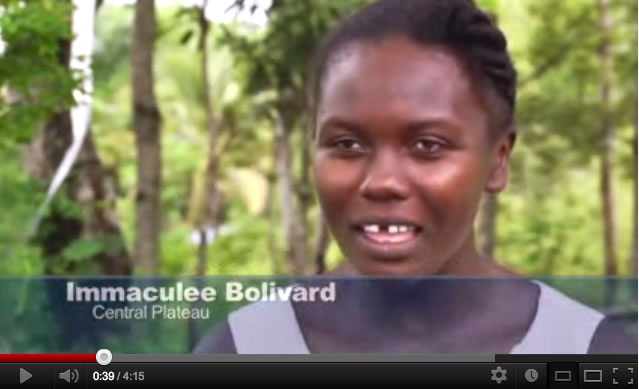Video: Preserving Dignity, Food Sovereignty in Haiti – MPP


The Prophet Isaiah speaks of a time that a new creation will come to pass when “they shall build houses and inhabit them; they shall plant vineyards and eat their fruit… they shall not plant and another eat.” Haitian farmer Childeric Placid, who also serves as a facilitator and community trainer with longtime Presbyterian Hunger Program (PHP) partner the Mouvman Peyizan Papay (MPP), had the opportunity to taste the reality of this promise as the result of a seed and tool program funded by the PC(USA) after the 2010 earthquake.
“The seeds were deliverance for me… I was able to plant corn and Congo beans. I’m eating the (harvest) even now, and in the future I will be able to plant the saved seeds and I’ll eat again. Yesterday, I ate from my garden. Can you imagine? I’m not like other people that don’t even have a cup of beans. Do you see how you’d feel? How you’d feel like you are a man? That’s what this is for me.”
Following the earthquake in Haiti, more than 10,000 families received tools and indigenous seeds purchased in the northern agricultural region of the country using funds given by Presbyterians to Presbyterian Hunger Program and Presbyterian Disaster Assistance. The seeds and tools allowed families not only to feed themselves, but to help the thousands of people who fled into rural areas following the disaster.
The preservation of the dignity of Haitian farmers wasn’t merely a relief and recovery effort. It was a chance for Presbyterians to meet the responsibility God has given all of us to care for God’s people in a way that is life affirming and empowering.
Buying locally in Haiti stimulated the economy, and using local seeds meant they could be used harvest after harvest. The results were immediate and long term, providing both food and opportunities for families.
VIEW “IMPACT THROUGH SEEDS” VIDEO
For more than 20 years, PHP has partnered with MPP, a farmers’ organization that works with 20,000 farmers. Their work focuses on sustainable agriculture, protection of the environment, conservation of soil, reforestation, sustainable management of water, implementation of alternative sources of energy, education and organization of cooperatives, public advocacy on agricultural production and land use issues aimed to build self-sustained and resilient communities.
MPP is one member of PHP’s Joining Hands Haiti Network. FONDAMA is made up of eleven Haitian grassroots and development organizations working together to address root causes of hunger and poverty in Haiti. In a country that has been hit hard by decades of dictatorship, structural adjustment and natural disasters, FONDAMA’s mission is to address systemic causes of hunger and not just symptoms. The network focuses on food sovereignty and agrarian reform, with the purpose, in a country where more than 80 percent of the population depends on agriculture, to secure land for the farmers, and to promote the right of people to produce the food needed for survival in accordance with their cultural traditions and through ecologically sustainable methods.
In 2004, MPP started the Road to Life Yard project as an experiment with the purpose of healing the land and producing food in small places. PC(USA) mission co-worker Mark Hare provided technical guidance for this project that reinforces Haitian agricultural efforts by diversifying production, and combining small animal husbandry with the cultivation of crops in the small areas surrounding each family’s home. In the last four years, the project has stopped being an experiment at MPP’s national training center in Papay, Hinche, and has begun to have a direct impact in the lives of rural families in the communities surrounding the center. Recently, the project has been moving to the national level, as many other organizations (which are part of FONDAMA) will implement it with their own community groups. Project crew members often lead this process, reproducing what they learn on the job in their own home gardens.
For people of faith, food is not just for consumption. It is a gift that provides fuel for our bodies and sustains life. It unites families and communities. It can mean a livelihood in areas of little hope, and nurtures the soul as much as the body.
This example of working on food sovereignty in Haiti reflects how PHP supports sustainable food systems that address the root causes of hunger around the world, rejecting systems that do not give priority to food and people. At the heart of PC(USA)’s food sovereignty work is, as Hare puts it, “the belief that when provided options, people can recover themselves. As Christians, we have the opportunity to see what kind of people Haitians are and realize how God is working with them and in them in incredible ways.”
The success of the seed program means that at this time PC(USA) is moving toward the next steps in the good work that is already being done with small farmers in Haiti.
By Jessica Maudlin, Presbyterian Hunger Program
